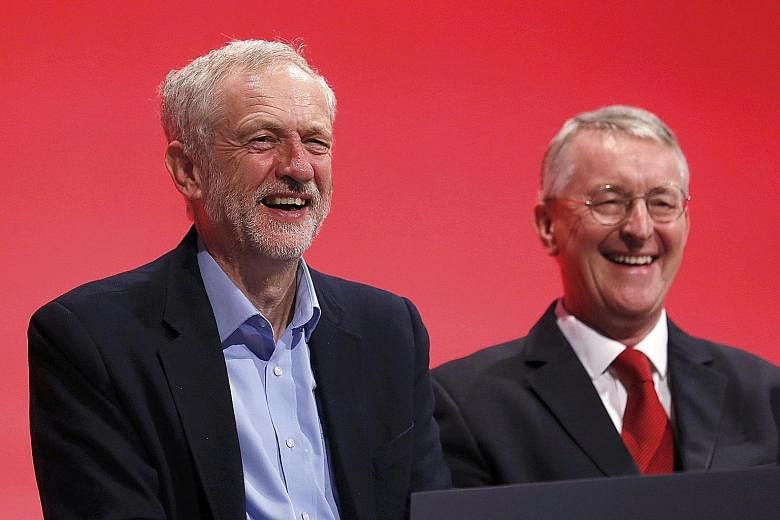Britain's opposition Labour Party, racked by growing internal divisions, has confounded opinion pollsters by winning a crucial parliamentary by-election.
But the victory on Friday in the city of Oldham does not paper over the deep personal and ideological splits that saw large numbers of Labour MPs rebelling against their party leader Jeremy Corbyn when they voted on the side of the ruling Conservative government on Wednesday in favour of air strikes in Syria.
Although Mr Corbyn hailed the unexpectedly strong electoral showing in Oldham as "a clear demonstration" that his "is the party working people trust", Labour's victory there was won in large part because of the strength of the local candidate. The win does nothing to mend the bitter intra-party feud and is not a sign that Labour's fortunes will be revived at the national level.
The town of Oldham, the historic heart of Britain's Industrial Revolution, the place which claims to have invented fish and chips as England's national dish and which was once home to no fewer than 360 textile mills, has always been safe Labour territory. The by-election was needed because of the sudden death of its sitting MP.
But this time Labour faced the real prospect of losing Oldham to a candidate from the UK Independence Party (UKIP), which advocates sealing off national borders to immigrants and pulling Britain out of the European Union. With unemployment high and at least a quarter of Oldham's 100,000-strong population originating from the Indian sub-continent, UKIP seemed poised to win by galvanising disenchanted and marginalised local working-class white voters.
In the event, Labour held the seat with an 11,000-strong overall majority. However, the UKIP challenger still came second, with almost 24 per cent of the vote.
Since his election as Labour leader in September, Mr Corbyn, 66, has struggled to revive a party that suffered a severe drubbing in this year's general election. That's largely due to his far-left policies that have alienated many of his own MPs and turned off voters.
Among other things, he wants Britain to abolish its monarchy and even proposed to engage in "peace talks" with Al-Qaeda and other terrorist groups. The ruling Conservatives now enjoy an 11-point lead in opinion polls.
As Parliament headed for a vote on authorising air strikes against terrorist hideouts in Syria, Mr Corbyn rebuffed the appeals of many Labour MPs who argued in favour of it. To add to the controversy, Mr Ken Livingstone, the man Mr Corbyn put in charge of Labour's defence policy, chose this week to claim that the July 2005 suicide bombers who killed 52 people in London "gave their lives" in protest at Britain's policies.
The result was a deep personal humiliation for Mr Corbyn: 66 Labour MPs, a quarter of the party's total, ignored their leader and voted with the government.
The most damaging rebellion was that of Mr Hilary Benn, Labour's chief foreign policy spokesman, who gave an impassioned speech in favour of action against Islamic State in Iraq and Syria (ISIS).
Air strikes, he argued, do have an effect in blunting advances by ISIS. He also appealed to Labour's history and its moral duty to stand up to fascism. It was a Labour government which helped found the United Nations, he noted. "As a party we have always been defined by our internationalism,'' he said. "We never have - and we never should - walk by on the other side of the road."
In a rousing finale, he told his fellow MPs : "We are here faced by fascists - not just their calculated brutality, but their belief that they are superior to every single one of us in the chamber tonight, and the people we represent.
"They hold us in contempt. They hold our values in contempt. They hold our belief in tolerance and decency in contempt. They hold our democracy, the means by which we will make our decision tonight, in contempt. And what we know about fascists is that they need to be defeated."
Mr Benn's rebellion against his party leader has a Shakespearian twist to it, for he is the son of Mr Tony Benn, an old far-left British politician who acted as the inspiration to Mr Corbyn. In effect, this is a case of the son destroying the policies of his father.
Few observers doubt that even with the Oldham victory, Labour risks political extinction unless it rids itself of its current leader. What is also clear from this week's events is that those looking desperately for an alternative leader have found their man: Mr Benn.

